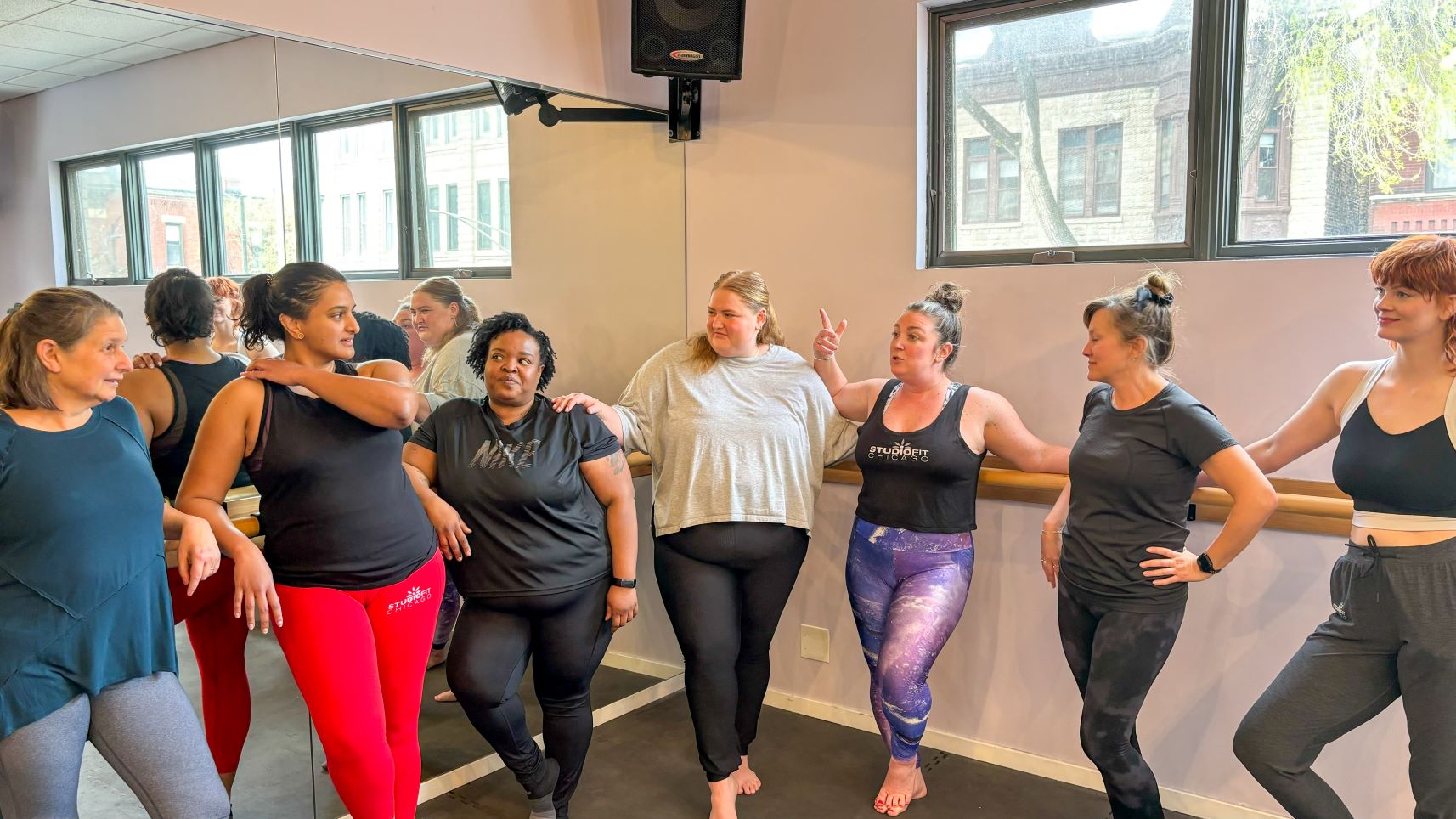Your Perimenopause Fitness and Nutrition Guide: Find Balance, Strength & Vitality:
Manage Symptoms with Confidence
Perimenopause, often referred to as “the change before the change,” is a transformative phase in every woman’s life. It’s the transitional period leading up to menopause, marked by fluctuating hormones, new physical sensations, and emotional shifts. While it might feel like a mystery ride at times, understanding what’s happening and taking proactive steps can make all the difference.
At Studio Fit Chicago, we believe every woman deserves to feel strong, confident, and empowered, especially during this significant life stage. There’s so much information and we would like to share how fitness and nutrition can help you navigate perimenopause and with resilience and grace.
What Is Perimenopause?
Perimenopause is the period leading up to menopause when your ovaries gradually reduce estrogen production. This transition typically begins in your late 40s but can start as early as your mid-30s for some women. The official marker of menopause is going 12 consecutive months without a menstrual period, but perimenopause can last anywhere from a few months to several years.
What Happens During Perimenopause?
As your hormone levels fluctuate, you may experience a range of symptoms that can affect your physical and emotional well-being. These changes are completely natural, but they often require adjustments in how you care for your body.
Common Symptoms of Perimenopause
Perimenopause doesn’t look the same for everyone, but some symptoms are more common than others. Let’s take a closer look at what to expect:
1. Hot Flashes
Hot flashes are sudden waves of intense heat that can leave you feeling flushed, sweaty, and uncomfortable. They often strike without warning and can be triggered by stress, spicy foods, or even warm weather.
Tips for Managing Hot Flashes:
- Identify triggers by keeping a journal of what you ate or experienced before a hot flash.
- Dress in layers to easily adjust your temperature.
- Use portable fans or cooling towels.
- Stay hydrated to regulate body temperature.
2. Irregular Periods
During perimenopause, your menstrual cycle may become unpredictable. You might skip a month, experience heavier or lighter flows, or notice longer gaps between periods.
What to Do:
- Track your cycles with a period app to identify patterns.
- Consult a healthcare provider if you experience unusually heavy bleeding or spotting between periods.
3. Mood Changes
Hormonal fluctuations can lead to increased irritability, anxiety, or even depression. It’s not uncommon to feel like your emotions are on a rollercoaster ride.
How to Manage Mood Swings:
- Practice mindfulness or meditation to stay grounded.
- Regular exercise can boost endorphins, your body’s natural mood enhancers.
- Consider talking to a therapist or joining a support group.
4. Sleep Disturbances
Night sweats and insomnia can make getting a good night’s sleep feel like a distant dream.
Sleep Solutions:
- Create a calming bedtime routine (e.g., avoid screens, read a book, or listen to soothing music).
- Keep your bedroom cool and dark.
- Avoid caffeine or heavy meals before bedtime.
5. Joint and Muscle Aches
Estrogen plays a role in reducing inflammation and maintaining joint health, so its decline can lead to stiffness or soreness.
Ways to Find Relief:
- Incorporate stretching or yoga into your daily routine.
- Focus on low-impact exercises like swimming or cycling.
- Stay hydrated and consider anti-inflammatory foods like turmeric and salmon.
Diagnosis and Treatment
Perimenopause is usually diagnosed based on your age, menstrual history, and symptoms. Blood tests may be used to confirm hormone levels, but they’re not always necessary.
Treatment Options
There’s no one-size-fits-all approach, but here are some options:
- Lifestyle Changes: Regular exercise, stress management, and a balanced diet can alleviate many symptoms.
- Hormone Therapy: Estrogen or progesterone supplements may help, but they’re not for everyone. Discuss risks and benefits with your doctor.
- Symptom-Specific Medications: Vaginal moisturizers, antidepressants, or over-the-counter sleep aids can address particular issues.
Fitness and Nutrition: The Ultimate Allies
At Studio Fit Chicago, we see fitness and nutrition as your secret weapons for navigating perimenopause with confidence and vitality. Here’s how:
Fitness: Your Hormone-Friendly Ally
Exercise is more than just movement, it’s a way to reclaim control over your body and mind.
- Mood Booster: Exercise releases endorphins, reducing irritability and anxiety.
- Supports Bone Health: Weight-bearing activities like strength training help combat bone loss.
- Regulates Weight: Hormonal changes often lead to weight gain, but exercise can keep your metabolism revved up.
- Improves Sleep: Physical activity during the day can lead to more restful nights.
Pro Tips:
- Start small: Even a 10-minute walk can make a difference.
- Mix it up: Include cardio, strength training, and flexibility exercises for a well-rounded routine.
- Listen to your body: Avoid overexertion and focus on consistency over intensity.
Nutrition: Fuel for Thriving
The right foods can ease symptoms and keep your energy levels steady.
- Phytoestrogens: Foods like soy, flaxseeds, and chickpeas mimic estrogen and may help balance hormones.
- Calcium and Vitamin D: Essential for strong bones—think leafy greens, almonds, and fortified dairy or plant-based milk.
- Omega-3s: Found in salmon, walnuts, and chia seeds, they combat inflammation and support brain health.
- Balanced Meals: Stabilize blood sugar with protein, whole grains, and plenty of veggies.
Sample Day of Meals:
- Breakfast: Greek yogurt with flaxseeds, berries, and a drizzle of honey.
- Lunch: Grilled chicken salad with leafy greens, avocado, and olive oil dressing.
- Snack: A handful of almonds and a piece of fruit.
- Dinner: Baked salmon with quinoa and roasted asparagus.
How Studio Fit Chicago Supports You
At Studio Fit Chicago, we’re committed to helping you thrive through perimenopause with personalized programs that address your unique needs.
- Customized Workouts: Tailored to build strength, improve flexibility, and reduce stress.
- Nutrition Guidance: Practical advice to fuel your body and manage symptoms effectively.
- Community Connection: Join a group of like-minded women who are on the same journey, providing encouragement and accountability.
Additional Resources
Looking for more support? Check out these books and tools:
- Books: The Wisdom of Menopause by Dr. Christiane Northrup.
- Apps: Period and symptom tracking apps like Flo or Clue.
- Podcasts: The Hormone Hub for practical advice and inspiration.
Embrace This Transition with Confidence
Perimenopause is a natural part of life, but it doesn’t have to feel overwhelming. With the right combination of fitness, nutrition, and community support, you can feel strong, confident, and in control.
Ready to start your journey? Contact Studio Fit Chicago today and let’s navigate this transition together!
Recent Posts
Table of Contents


Check Out Our Other Pages
SHARE THIS POST WITH YOUR FRIENDS
Love Studio Fit Chicago? Share this fitness content with your friends! 🏋️♂️💙 Click one of the buttons below and let them in on the secret to a healthier, happier you.
Contact Studio Fit Chicago
Ready to take the next step in your fitness journey? Contact us today to learn more about our personalized fitness programs, nutrition coaching, and supportive community designed exclusively for women.




6 Responses